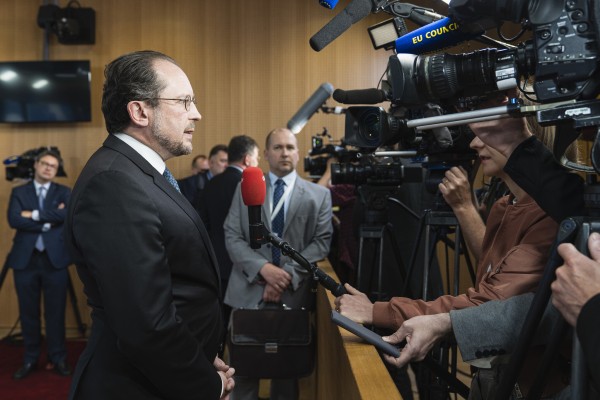High Security Risk - Travel Warning for Austrians to Return as Long as Still Possible
Due to the coronavirus crisis, Austria's Foreign Minister Schallenberg has raised the travel warning for all countries worldwide to "high security risk" (security level 4 of 6). He is calling for citizens to return to Austria as long as there are still opportunities for return travel.
 Foreign Minister Schallenberg: "We urgently advise against all non-essential travel." / Picture: © BMEIA Bundesministerium für Europa, Integration und Äußeres / Eugénie Berger / Flickr Attribution 2.0 Generic (CC BY 2.0)
Foreign Minister Schallenberg: "We urgently advise against all non-essential travel." / Picture: © BMEIA Bundesministerium für Europa, Integration und Äußeres / Eugénie Berger / Flickr Attribution 2.0 Generic (CC BY 2.0)
The BMEIA Federal Ministry for Europe Integration and Foreign Affairs strongly advises against all non-essential travel.
All countries worldwide are set to "high security risk" (security level 4 of 6).
This is an extraordinary but necessary step that we have taken this evening.
The unpredictability of the spread of the virus requires particular vigilance on the part of the Austrians.
We therefore urgently advise against all non-essential travel and call for people to return to Austria as long as there are still opportunities for return travel, the Foreign Minister announced.
Security level 4 of 6 is a high level that can be set by the BMEIA
The Ministry of Foreign Affairs establishes the following criteria for classifying the security situation.
This categorisation is drawn up and regularly updated on the basis of extensive information provided by Austrian and European representative authorities.
It is intended to offer travellers the greatest possible transparency and the broadest possible basis for travel decisions.
Starting from a good safety standard, which takes Austrian conditions as a benchmark, the safety risk is graded in ascending order to allow differentiation and finds its highest level in the travel warning.
As a rule, the Foreign Ministry issues travel warnings only in special crisis situations (e.g. war or civil war-like situations in a country), if there is a general danger to life and limb. The assessment of a country's security situation with regard to a travel warning is not based on the evaluation of individual tragic events, but on the overall situation in a region or state based on the information available to the Foreign Ministry. How a state deals with the danger also plays an important role in this context. A key factor here is whether precautions to prevent further attacks, international cooperation and basic support for those affected are planned.



